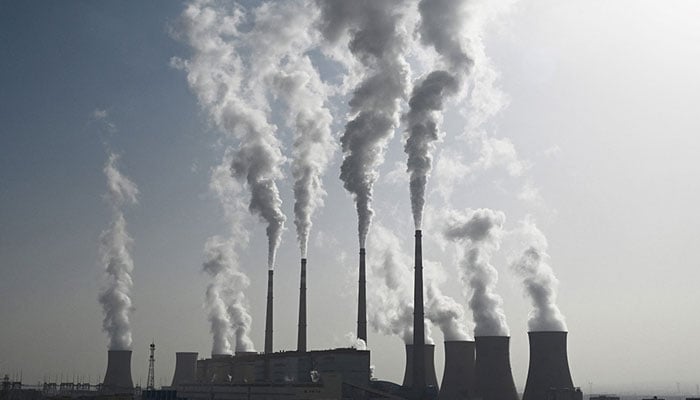Carbon tax under consideration for next budget
A carbon tax reflecting the social cost of carbon is viewed as an essential policy tool to limit carbon emissions
ISLAMABAD: The government is contemplating upon different options for imposing Carbon Tax in the next budget in a bid to reduce the demand for carbon emitting fossil fuels.
Instead of accepting the IMF demand for imposing 18 percent General Sales Tax (GST) on POL products on top of the Petroleum Development Levy (PDL), Pakistani authorities have floated the idea of slapping Carbon Levy in the upcoming budget 2024-25 for reducing the demand for POL products and other carbon emitting goods.
“The possibility of slapping Carbon Tax is under consideration at the import stage on POL products and other fossil fuels. It may be in the shape of carbon levy which will help the federal government to collect and keep the whole amount for meeting its expenditures instead of becoming it as part of Federal Divisible Pool under the NFC Award,” top official sources confirmed while talking to The News here on Wednesday.
The government through the Finance Bill 2024-25 may propose to get powers for imposing carbon levy in the range up to Rs20 to 30 per liter or in case of coal for certain amount in order to jack up the prices of fossil fuels in a bid to reduce the demand for such goods causing harm to clean environment.
A carbon tax reflecting the social cost of carbon is viewed as an essential policy tool to limit carbon emissions: high prices for carbon-emitting goods reduce demand for them. The carbon tax is generally levied on fossil fuels.
Some countries have already adopted such a tax and discussions are ongoing in others. There are proponents of a global carbon tax too. Yet, governments are often keener to adopt measures other than a tax to contain carbon emissions. And amongst countries that have adopted a carbon tax, the levels vary substantially, and other measures exist alongside it. It is natural to ask why a carbon tax is not used universally in preference to other policies to limit emissions and why, even if there is such a tax, other policies are needed too.
During the last review talks held between Pakistan and the IMF mission for the conclusion of second review under $3 billion Standby Arrangement (SBA) programme, the idea of imposing Carbon Levy has come under discussion and it might be considered for the upcoming budget for 2024-25.
The federal government seems interested to take all such measures where the collected revenues do not become part of the FDP of NFC because the major chunk, up to 60 percent, was distributed among the provinces of all those taxes which become part of the NFC. So the federal government is keen to take measures through any levy so that collected resources will remain under its domain only, instead of becoming a part of the Federal Divisible Pool under the NFC Award.
However, the IMF in its technical assistance diagnostic states that the petroleum products have been exempted from Sales Tax since March 2022 while the revenues from Sales Tax are shared with the provinces (under the NFC Award). The PDL stays with the federal government. Despite a substantial increase in the PDL rate, taxation of petroleum products has declined since 2019. The total rate of taxation on petrol was 29 percent of the sale price since 2019 (14.5 both for PDL and Sales Tax).
In September 2023, taxes made out of 19.6 percent of the sales price. “The relatively low rate of taxation of petrol is also reflected in the sale price relative to other countries,” the IMF pointed out and cited an example that in selected neighbouring countries and emerging economies, the average 2023 price of gasoline at the pump was $1.12 per liter against $0.97 per liter in Pakistan. The retail price for diesel in 2023 was equivalent in Pakistan and certain comparator at an average price of $1 per liter.
-
 Cardi B Finally Responds To Accusations About Destroying 'SNL' Set After Nicki Minaj Joke
Cardi B Finally Responds To Accusations About Destroying 'SNL' Set After Nicki Minaj Joke -
 Gorton And Denton By-election Result: Green Party Defeats Labour In Blow To Keir Starmer
Gorton And Denton By-election Result: Green Party Defeats Labour In Blow To Keir Starmer -
 Jack Dorsey Cuts 4,000 Roles, Says AI Requires Smaller Teams
Jack Dorsey Cuts 4,000 Roles, Says AI Requires Smaller Teams -
 Reggie Bannister Health Takes ‘difficult Turn’ Amid Dementia, Parkinson’s Battle
Reggie Bannister Health Takes ‘difficult Turn’ Amid Dementia, Parkinson’s Battle -
 'Humble Traitor' Rob Rausch Makes Unexpected Move After Betraying Maura Higgins In Season 4
'Humble Traitor' Rob Rausch Makes Unexpected Move After Betraying Maura Higgins In Season 4 -
 Sarah Ferguson Drops An Accusation Against Andrew? ‘He Just Wants Leverage’
Sarah Ferguson Drops An Accusation Against Andrew? ‘He Just Wants Leverage’ -
 Anthropic Rejects Pentagon Military AI Proposal, Holds Firm On Safety Guardrails —What’s Next?
Anthropic Rejects Pentagon Military AI Proposal, Holds Firm On Safety Guardrails —What’s Next? -
 'Traitors' Reunion Drama: Rob Rausch Defends Strategy, Makes Shocking Revelation After Victory
'Traitors' Reunion Drama: Rob Rausch Defends Strategy, Makes Shocking Revelation After Victory -
 Inside Hillary Clinton’s Epstein Testimony: Key Takeaways And Highlights Explained
Inside Hillary Clinton’s Epstein Testimony: Key Takeaways And Highlights Explained -
 'Too Hard To Be Without’: Woman Testifies Against Instagram And YouTube
'Too Hard To Be Without’: Woman Testifies Against Instagram And YouTube -
 Kendall Jenner Recalls Being ‘too Stressed’: 'I Want To Focus On Myself'
Kendall Jenner Recalls Being ‘too Stressed’: 'I Want To Focus On Myself' -
 Ethel Kennedy’s 34 Grandchildren And The Expanding Kennedy Family Legacy
Ethel Kennedy’s 34 Grandchildren And The Expanding Kennedy Family Legacy -
 Dolly Parton Achieves Major Milestone For Children's Health Advocacy
Dolly Parton Achieves Major Milestone For Children's Health Advocacy -
 'The White Lotus' Creator Mike White Calls 'Survivor' Fans 'sadistic'
'The White Lotus' Creator Mike White Calls 'Survivor' Fans 'sadistic' -
 Oilers Vs Kings: Darcy Kuemper Pulled After Allowing Four Goals In Second Period
Oilers Vs Kings: Darcy Kuemper Pulled After Allowing Four Goals In Second Period -
 Calgary Weather Warning As 30cm Snow And 130 Km/h Winds Expected
Calgary Weather Warning As 30cm Snow And 130 Km/h Winds Expected




